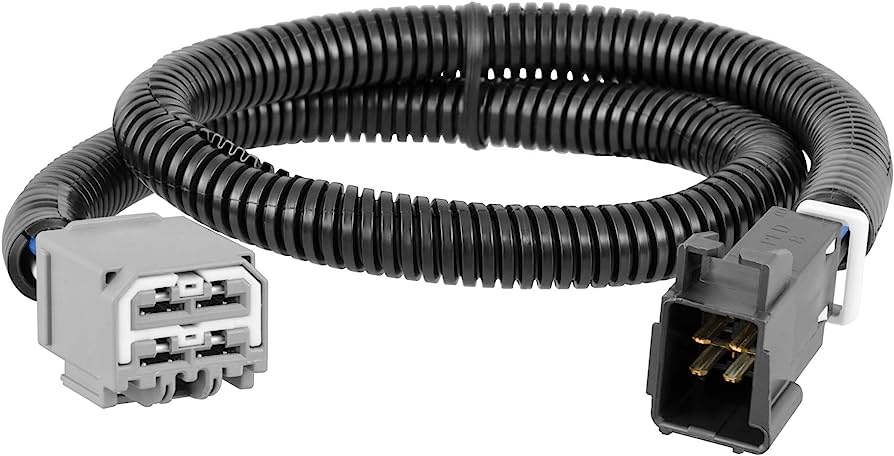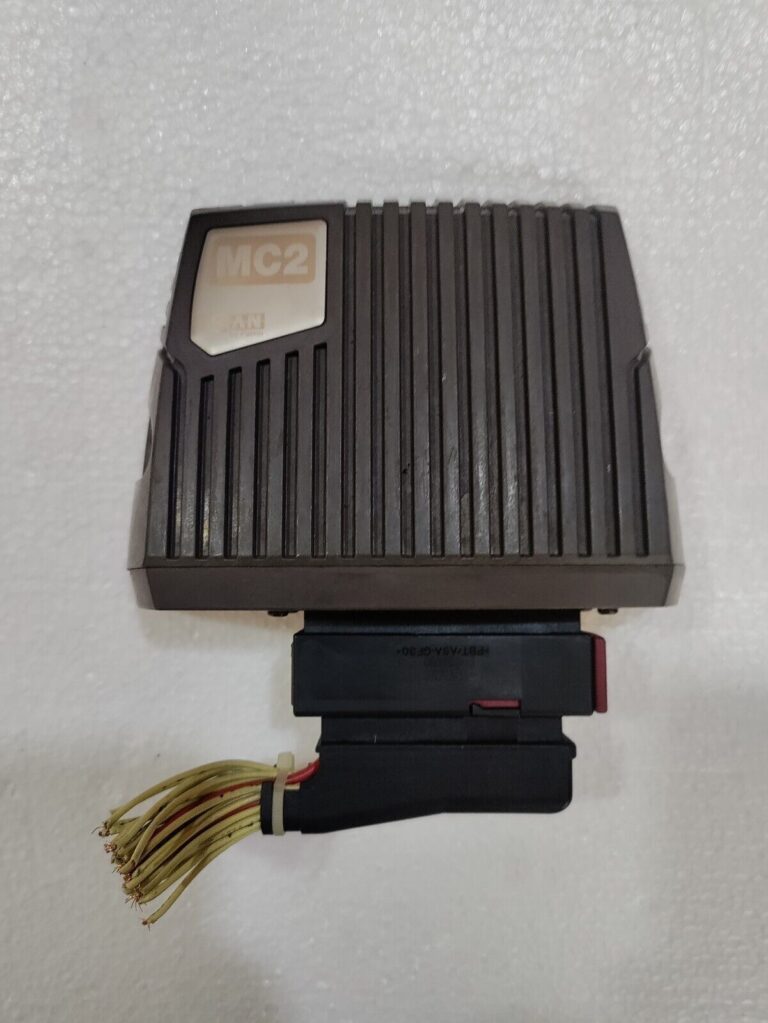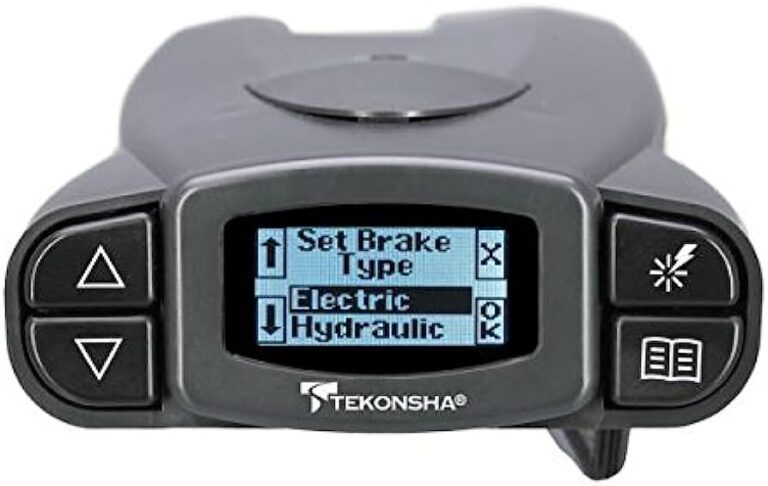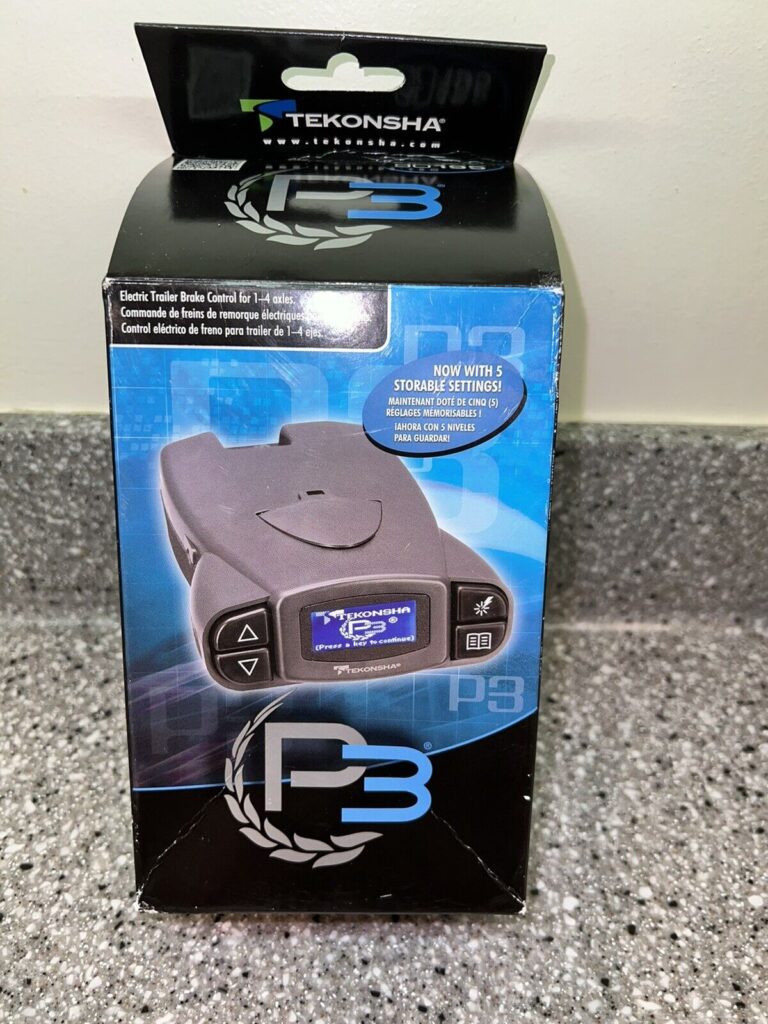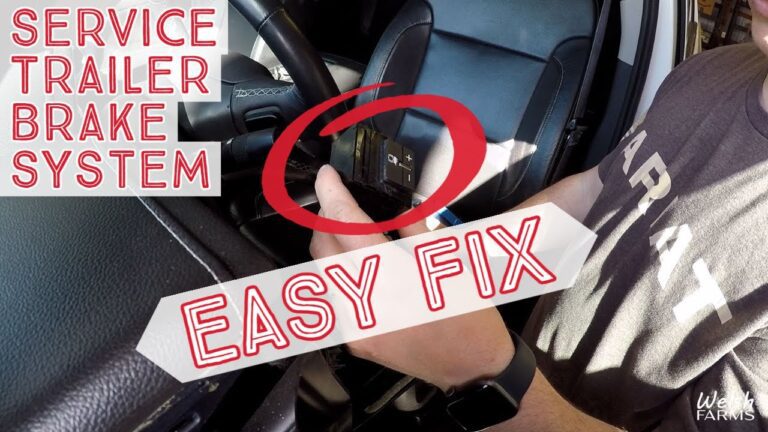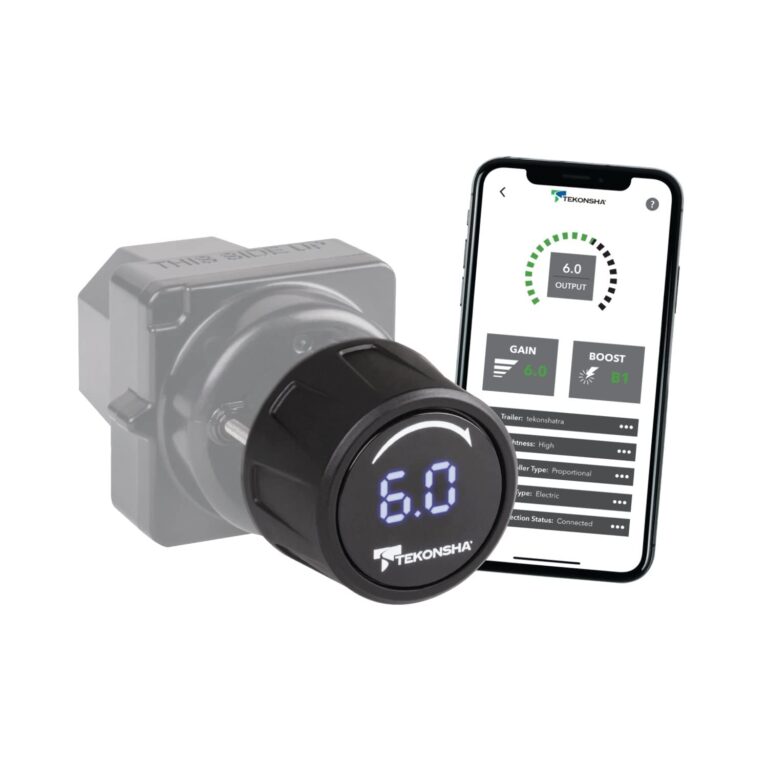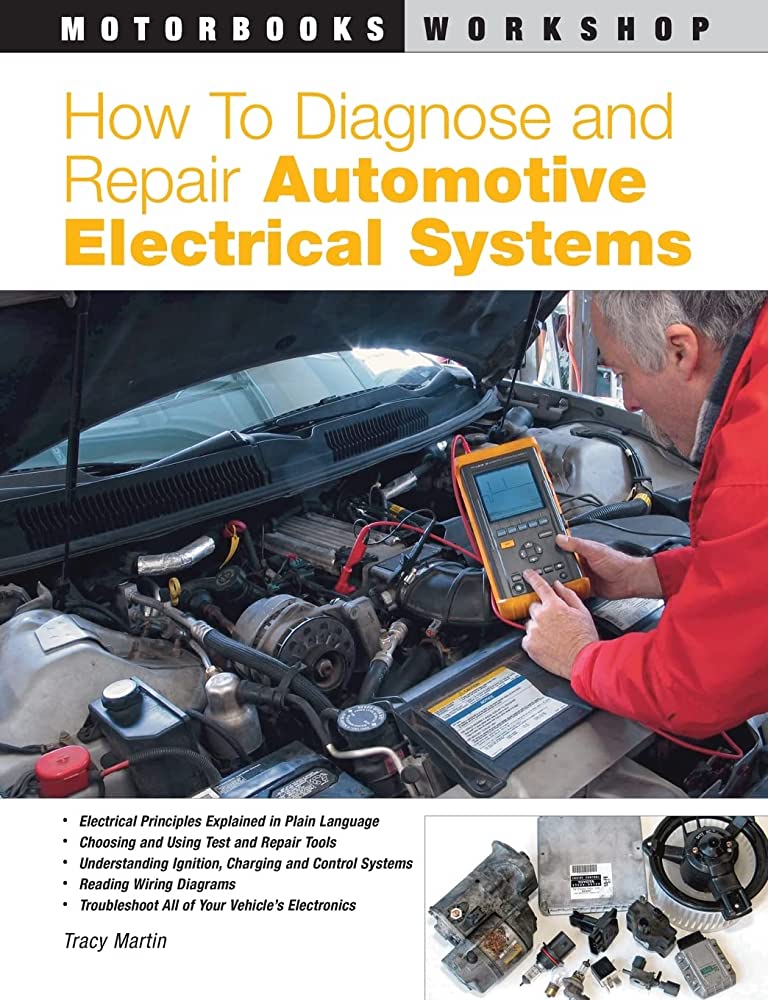Comparison of Different Types of Trailer Brake Controllers: Find Your Perfect Fit
Trailer brake controllers can be compared based on their type, including time-delayed, proportional, and inertia-based controllers. Trailer brake controllers come in various types, each providing distinct features and benefits.
These types include time-delayed, proportional, and inertia-based controllers. As a driver, it is crucial to understand the differences between these controllers to determine which one suits your needs best. A time-delayed controller applies a pre-set amount of braking force to the trailer after a specific time delay, whereas a proportional controller delivers braking force in proportion to the vehicle’s deceleration.
On the other hand, an inertia-based controller adjusts the braking force based on the trailer’s movement and inertia. By comparing these different types of trailer brake controllers, you can make an informed decision and ensure your safety while towing a trailer.
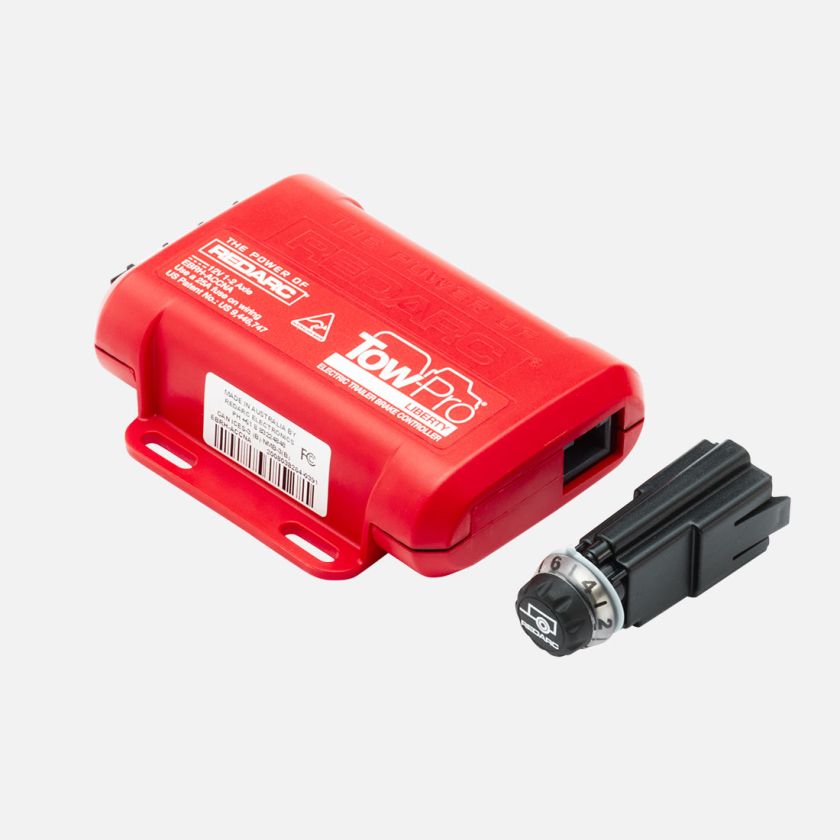
Credit: www.redarcelectronics.com
Electric Trailer Brake Controllers
Explanation And Functionality Of Electric Trailer Brake Controllers
Electric trailer brake controllers are devices designed to provide a seamless and controlled braking experience when towing a trailer. These controllers are typically installed inside the tow vehicle and work by applying the necessary braking force to the trailer’s electric brakes.
The functionality of electric trailer brake controllers is based on several key components:
- Brake activation: The controller detects when the tow vehicle’s brakes are applied and sends an electrical signal to the trailer’s brakes, engaging them simultaneously.
- Brake intensity adjustment: Electric brake controllers allow users to adjust the intensity of the trailer’s brakes based on the weight and load distribution of the trailer.
- Proportional braking: High-quality electric brake controllers feature proportional braking, which means they adjust the braking force based on the deceleration of the tow vehicle. This ensures a smoother and more consistent braking experience.
- Manual override: In emergency situations or when additional braking power is needed, electric brake controllers provide a manual override option. This allows the driver to manually engage the trailer’s brakes independently of the tow vehicle’s brakes.
Overall, electric trailer brake controllers offer precise and efficient control over the braking system of a trailer, significantly improving safety and stability while towing.
Benefits And Advantages Of Using Electric Trailer Brake Controllers
Using electric trailer brake controllers comes with several benefits and advantages that make them an essential component for towing safety:
- Enhanced control: Electric brake controllers provide the ability to adjust the braking force according to the specific towing situation. This allows for better control and stability, especially when towing heavier loads or traveling on steep hills.
- Reduced brake wear: By distributing the braking force between the tow vehicle and the trailer, electric brake controllers help reduce wear on the tow vehicle’s brakes. This extends the lifespan of the vehicle’s braking system and reduces maintenance costs.
- Improved safety: The proportional braking feature of electric brake controllers ensures that the trailer’s brakes engage in proportion to the tow vehicle’s brakes, preventing excessive stopping distances and potential accidents.
- Versatility: Electric trailer brake controllers are compatible with various trailer types and sizes. They can be adjusted to accommodate different towing weights, making them suitable for a wide range of towing applications.
Considerations When Choosing An Electric Trailer Brake Controller
Before purchasing an electric trailer brake controller, it is important to consider the following factors:
- Towing capacity: Ensure that the brake controller you choose is compatible with the towing capacity of your vehicle. It should be able to handle the weight of your trailer to ensure optimal braking performance.
- Brake type compatibility: Different trailers may have different types of electric brakes, such as electric drum brakes or electric disc brakes. Ensure that the brake controller you select is compatible with the type of brakes on your trailer.
- Installation ease: Consider the installation process of the brake controller. Some controllers may require professional installation, while others can be installed by the user. Choose a controller that aligns with your installation capabilities.
- Budget: Set a budget for the brake controller and look for options that provide the necessary features within your budget range. Consider investing in a high-quality controller for better performance and longevity.
Key Features To Look For In Electric Trailer Brake Controllers
When choosing an electric trailer brake controller, look for the following key features that enhance performance and functionality:
- Proportional/inertia-based braking: Controllers with this feature provide a more seamless and consistent braking experience by adjusting the braking force based on the deceleration of the tow vehicle.
- Manual override capability: A manual override feature allows for immediate and independent braking of the trailer, providing additional control in emergency situations or when more braking power is required.
- Easy-to-read display: Look for controllers with clear and easy-to-read displays that provide real-time information about braking force, gain settings, and diagnostics.
- Plug-and-play compatibility: Some controllers offer plug-and-play installation, making it easier to connect and set up without requiring extensive wiring or modifications.
- Multiple axle support: Consider controllers that can handle multiple axles, especially if you are towing a trailer with more than one set of brakes.
Comparison Of Popular Electric Trailer Brake Controllers In The Market
Here is a comparison of popular electric trailer brake controllers available in the market:
- Tekonsha p3 brake control: This controller offers advanced proportional braking, multiple axle support, and a user-friendly interface with customizable options.
- Curt echo mobile brake controller: The echo mobile brake controller utilizes bluetooth connectivity to control trailer brakes wirelessly from a smartphone. It offers easy installation and versatility.
- Reese towpower 8508211 brake control: This brake controller features proportional braking, a compact design, and supports up to four axles.
- Hayes 81741b energize iii plus brake controller: The energize iii plus offers proportional braking, is compatible with electric drum brakes, and has a sleek and simple design.
Tips For Installing And Setting Up Electric Trailer Brake Controllers
To ensure a smooth installation and setup process for your electric trailer brake controller, consider the following tips:
- Read the manufacturer’s instructions thoroughly before attempting installation.
- Mount the brake controller in a convenient location within reach of the driver.
- Connect the controller to the tow vehicle’s power supply and brake light circuit following the provided wiring instructions.
- Adjust the gain settings and braking intensity based on the trailer’s weight and load distribution.
- Test the braking system in a controlled environment to ensure proper functionality.
- Regularly inspect and maintain the brake controller and associated wiring for any signs of damage or wear.
Proper installation and setup of the electric trailer brake controller are crucial for optimal performance and safety while towing.
Hydraulic Trailer Brake Controllers
Explanation And Functionality Of Hydraulic Trailer Brake Controllers
Hydraulic trailer brake controllers are an essential component of trailers equipped with hydraulic brakes. These controllers play a crucial role in ensuring the safety and stability of towing vehicles. Here are the key points about the explanation and functionality of hydraulic trailer brake controllers:
- Hydraulic trailer brake controllers work by activating the trailer’s hydraulic brakes in synchronization with the towing vehicle’s braking system.
- They use a hydraulic pressure sensing mechanism to detect when the towing vehicle’s brakes are applied and send the appropriate amount of hydraulic pressure to the trailer’s brakes.
- This synchronization ensures smooth and proportional braking, preventing the trailer from pushing or pulling the towing vehicle during deceleration or sudden stops.
- Hydraulic trailer brake controllers are typically mounted inside the towing vehicle’s cabin, allowing the driver to control the brake force applied to the trailer through a manual lever or an electronic interface.
- They rely on the hydraulic fluid flow between the towing vehicle and the trailer to facilitate effective braking.
Advantages And Disadvantages Of Hydraulic Trailer Brake Controllers
Hydraulic trailer brake controllers come with their own set of advantages and disadvantages. Let’s delve into the key points of each:
Advantages:
- Provides smooth and proportional braking, ensuring the safety and stability of the towing vehicle and the trailer.
- Compatible with a wide range of trailers equipped with hydraulic braking systems.
- Offers manual control over brake force, allowing the driver to adjust the braking intensity based on specific towing conditions.
- Minimal lag time between the towing vehicle’s brake application and trailer brake activation, resulting in quicker response times.
- Suitable for heavy-duty trailers and towing applications, providing sufficient braking force.
Disadvantages:
- Requires hydraulic braking systems installed on both the towing vehicle and the trailer, which may require additional installation and maintenance efforts.
- More complex and expensive compared to other types of trailer brake controllers.
- May not be compatible with trailers that have electric braking systems, limiting its versatility.
Factors To Consider When Choosing A Hydraulic Trailer Brake Controller
When selecting a hydraulic trailer brake controller, several factors need to be considered. Here are the key points to keep in mind:
- Compatibility: Ensure that the hydraulic trailer brake controller is compatible with your trailer’s hydraulic braking system.
- Towing capacity: Consider the towing capacity of your trailer and choose a hydraulic brake controller that can handle the appropriate braking force.
- Ease of installation: Look for a controller that offers easy installation, preferably with clear instructions and minimal wiring requirements.
- Adjustability: Opt for a controller that provides adjustable braking force settings, allowing you to fine-tune the brake response based on different towing scenarios.
- User interface: Consider the type of control interface, whether it’s a manual lever or an electronic interface, and choose one that suits your preference and convenience.
Key Features To Look For In Hydraulic Trailer Brake Controllers
When evaluating hydraulic trailer brake controllers, certain key features should be taken into account. Here are the crucial points:
- Proportional braking: Look for a controller that offers proportional braking, ensuring smooth and synchronized braking between the towing vehicle and trailer.
- Manual override: Consider a controller with a manual override function, which allows you to manually activate the trailer brakes independently of the towing vehicle’s brakes for added control in emergency situations.
- Diagnostic features: Some controllers provide diagnostic features such as error codes or troubleshooting indicators to help identify any issues with the brake system.
- Easy-to-read display: Choose a controller with a clear and user-friendly display that provides real-time information about braking force, gain settings, and system status.
- Weather resistance: Opt for a controller that is resistant to water, dust, and other environmental elements, ensuring its durability and performance under various conditions.
Comparison Of Popular Hydraulic Trailer Brake Controllers In The Market
Here are some popular hydraulic trailer brake controllers available in the market and their key points of comparison:
- Tekonsha prodigy p3: Offers advanced proportional braking, multiple preset braking modes, and a user-friendly lcd display.
- Hayes genesis g2: Provides proportional braking, an easy-to-use manual slide lever, and compatibility with single, dual, or triple axle trailers.
- Curt echo: An innovative wireless bluetooth controller that connects directly to your smartphone, offering proportional braking and adjustable gain settings.
- Dexter predator dx2: Features proportional braking, an adjustable gain knob, and a compact design suitable for a variety of towing vehicles.
Installation And Setup Tips For Hydraulic Trailer Brake Controllers
To ensure a successful installation and setup of hydraulic trailer brake controllers, consider the following tips:
- Read the manufacturer’s instructions carefully before starting the installation process.
- Mount the controller in a suitable location within reach of the driver for easy access and control.
- Follow proper wiring techniques, ensuring secure connections and preventing wire damage.
- Bleed the trailer’s hydraulic braking system to remove any air bubbles for optimal performance.
- Adjust the braking force using the controller’s gain settings according to the specific towing requirements and road conditions.
- Test the brakes several times in a controlled environment before taking the trailer onto the road.
Remember, hydraulic trailer brake controllers are crucial for the safe and smooth operation of your trailer. By understanding their functionality, considering the relevant factors when choosing one, and following proper installation and setup procedures, you can ensure a reliable braking system for your towing needs.
Proportional Vs. Time Delayed Trailer Brake Controllers
Explanation Of The Difference Between Proportional And Time Delayed Trailer Brake Controllers
Proportional and time delayed trailer brake controllers are two different types of devices used to control the braking action of a trailer. Understanding the difference between them is essential for making an informed decision when choosing the right brake controller for your setup.
Pros And Cons Of Proportional Trailer Brake Controllers
Proportional trailer brake controllers offer several advantages over time delayed controllers. Here are the key points to consider:
- Highly responsive: Proportional controllers automatically adjust the trailer’s braking power in direct proportion to the braking force applied by the towing vehicle. This results in a smooth and seamless braking experience.
- Enhanced safety: The proportional braking system provides increased control and stability, helping to prevent trailer sway and reducing the risk of accidents during sudden stops or emergency maneuvers.
- Easy installation: Most proportional brake controllers are designed for plug-and-play installation, making them user-friendly and hassle-free.
- Compatibility: Proportional brake controllers are compatible with various trailer types and sizes, making them versatile and suitable for a wide range of towing applications.
However, proportional brake controllers also have a few drawbacks to consider:
- Higher cost: Proportional controllers tend to be more expensive compared to time delayed controllers. However, the additional safety and convenience they provide often make the investment worthwhile.
- Require calibration: Proportional brake controllers may require initial calibration to ensure optimal performance. While this adds a step to the installation process, it ensures precise braking control.
Pros And Cons Of Time Delayed Trailer Brake Controllers
Time delayed trailer brake controllers have their own set of advantages and disadvantages. Consider the following points:
- Cost-effective option: Time delayed controllers are generally less expensive than proportional controllers, making them a budget-friendly choice for those who prioritize cost savings.
- Simplicity: These controllers use a pre-set time delay to determine the braking force applied to the trailer. They are relatively straightforward to install and require minimal adjustment.
- Suitable for light loads: Time delayed controllers work well for smaller trailers and lighter loads, where the braking requirements are less demanding.
However, time delayed controllers also have some limitations:
- Less responsive: Since time delayed controllers apply a fixed level of braking power, they may not provide as smooth and precise braking as proportional controllers. The braking force applied is the same regardless of the towing vehicle’s braking force.
- Increased wear and tear: The fixed time delay could result in excessive wear on the trailer brakes, especially in situations where the towing vehicle consistently applies heavy or prolonged braking.
Considerations When Deciding Between Proportional And Time Delayed Trailer Brake Controllers
Choosing between proportional and time delayed trailer brake controllers depends on factors such as your towing needs, budget, and personal preferences. Keep the following considerations in mind:
- Towing conditions: If you frequently tow heavy loads or encounter challenging terrains, a proportional brake controller is recommended for its superior responsiveness and safety features.
- Budget: If cost is a primary concern and you primarily tow lighter loads, a time delayed brake controller might be a suitable option.
- Installation and calibration: Consider your comfort level with installation and calibration processes. Proportional controllers may require more initial setup, whereas time delayed controllers offer simpler installation.
Comparison Of Popular Proportional And Time Delayed Trailer Brake Controllers In The Market
When it comes to popular proportional brake controllers, options like the tekonsha prodigy p2 and the reese towpower 8507111 offer advanced features and excellent performance. On the other hand, time delayed brake controllers like the curt 51110 venturer and the hopkins 47297 agility provide cost-effective solutions for lighter towing needs.
Compare the features and specifications of these controllers to find the one that best suits your specific requirements.
Wireless Trailer Brake Controllers
Introduction To Wireless Trailer Brake Controllers
Wireless trailer brake controllers are innovative devices that offer convenience and ease of use when it comes to controlling the brakes of your trailer. Unlike traditional brake controllers that require a physical connection, wireless brake controllers use wireless technology to establish a connection between the tow vehicle and trailer.
This eliminates the need for cumbersome wiring and provides a seamless experience for trailer braking.
Benefits And Drawbacks Of Wireless Trailer Brake Controllers
Wireless trailer brake controllers come with their own set of benefits and drawbacks. Here are the key points to consider:
Benefits:
- Easy installation: Wireless brake controllers are simple to install as they don’t require any wiring or splicing.
- Versatility: Since they are not permanently mounted, wireless controllers can be easily transferred between vehicles or trailers.
- Convenience: With a wireless controller, you can control the trailer brakes wirelessly from inside the tow vehicle, providing a hassle-free experience.
- Adjustable settings: Many wireless controllers offer adjustable brake settings, allowing you to fine-tune the braking power according to your needs.
Drawbacks:
- Limited range: Wireless brake controllers have a limited range, typically within 50 feet, which may not be ideal for larger trailers.
- Battery-powered: Wireless controllers rely on batteries for operation, which means they need to be regularly checked and replaced.
- Signal interference: In certain situations, wireless controllers may experience signal interference, resulting in temporary loss of connection.
Factors To Consider When Choosing A Wireless Trailer Brake Controller
When selecting a wireless trailer brake controller, it’s important to consider the following factors:
- Range: Determine the range of the wireless controller based on the size and type of trailers you will be towing.
- Compatibility: Ensure the wireless controller is compatible with your tow vehicle and trailer’s braking system.
- Braking power: Consider the braking power provided by the controller and ensure it is suitable for your specific towing needs.
- User interface: Look for a controller with an intuitive and user-friendly interface for easy operation.
- Battery life: Check the battery life of the wireless controller and consider how often the batteries will need to be replaced or recharged.
Key Features To Look For In Wireless Trailer Brake Controllers
When searching for a wireless trailer brake controller, keep an eye out for the following key features:
- Wireless connectivity: Ensure the controller uses reliable wireless technology for a stable connection.
- Adjustable settings: Look for controllers that allow you to adjust the braking power and sensitivity to suit your trailer and towing conditions.
- Brake override capability: Choose a controller that offers a brake override feature, which can be useful in emergency situations.
- Lcd display: Opt for a controller with a clear lcd display that provides important information such as brake intensity and battery status.
- Compatibility: Make sure the controller is compatible with both your tow vehicle and trailer’s braking system for seamless operation.
Comparison Of Popular Wireless Trailer Brake Controllers In The Market
- Brand x wireless brake controller:
- Adjustable brake settings for fine-tuning braking power.
- Led display for easy monitoring of brake intensity.
- Compatible with most trailer braking systems.
- Wireless range of up to 50 feet.
- Battery-powered with long battery life.
- Brand y wireless brake controller:
- Simple plug-and-play installation without any wiring required.
- Intuitive user interface for easy operation.
- Adjustable sensitivity for precise control of trailer brakes.
- Signal interference protection for reliable wireless connection.
- Suitable for trailers up to 4,000 pounds.
- Brand z wireless brake controller:
- Compact and portable design for easy transfer between vehicles.
- Adjustable gain for precise control over braking force.
- Battery status indicator for monitoring battery life.
- Compatible with most electric and electric over hydraulic braking systems.
- Wireless range of up to 60 feet.
Tips For Installing And Setting Up Wireless Trailer Brake Controllers
Proper installation and setup of wireless trailer brake controllers are essential for their optimal performance. Consider the following tips:
- Read the manufacturer’s instructions thoroughly before installation.
- Ensure the controller is securely mounted within reach of the driver.
- Follow the recommended steps for pairing the controller with your tow vehicle.
- Test the brakes to ensure proper operation before towing.
- Regularly check the battery level and replace or recharge as needed.
- Adjust the brake settings according to your specific towing requirements.
Remember, wireless trailer brake controllers offer convenience and flexibility in controlling your trailer’s brakes. By considering the key factors, features, and installation tips, you can choose the right controller for your towing needs and enjoy a smoother and safer towing experience.
Integrated Trailer Brake Controllers
Explanation Of Integrated Trailer Brake Controllers
Integrated trailer brake controllers are built-in braking systems that are often included in newer vehicles or can be installed as an add-on. These controllers are designed to provide a seamless connection between the towing vehicle and the trailer, allowing the driver to control and adjust the brakes on the trailer from inside the vehicle.
Here are some key points to understand about integrated trailer brake controllers:
- Integrated trailer brake controllers are specifically designed to work with the vehicle’s existing brake system, utilizing the vehicle’s electrical and hydraulic systems to activate the trailer brakes.
- They feature a user-friendly interface that allows the driver to adjust the brake force applied to the trailer, ensuring optimal braking performance depending on the load and road conditions.
- Integrated controllers typically offer precise braking control, allowing for smoother stops and improved handling while towing.
- These controllers can be customized to match the weight and size of the trailer, ensuring effective braking regardless of the load being towed.
- They are usually located near the dashboard or steering wheel for easy access and visibility while driving.
Advantages And Disadvantages Of Integrated Trailer Brake Controllers
Just like any other braking system, integrated trailer brake controllers come with their own set of advantages and disadvantages. Here are some key points to consider:
Advantages:
- Seamless integration: Integrated brake controllers are designed to work harmoniously with the vehicle’s brake system, ensuring optimal braking performance.
- Precise control: These controllers allow for fine-tuning of the brake force applied to the trailer, providing greater control and stability while towing.
- Convenience: With the controller located within reach of the driver, adjusting the trailer brakes becomes quick and easy.
- Safety: Trailer brake controllers contribute to safer towing by significantly reducing stopping distances and minimizing the risk of trailer sway or jackknifing.
Disadvantages:
- Vehicle compatibility: Integrated brake controllers may not be available in all vehicles or compatible with older models. In such cases, aftermarket options may need to be considered.
- Cost: Depending on the vehicle and its options, integrated controllers can be more costly compared to aftermarket alternatives.
- Limited adjustability: Some integrated brake controllers may have fewer adjustable settings compared to standalone controllers, limiting customization options.
Considerations When Choosing An Integrated Trailer Brake Controller
When selecting an integrated trailer brake controller, there are a few factors that should be taken into consideration:
- Vehicle compatibility: Ensure that the controller is compatible with your vehicle’s make and model, as not all vehicles come equipped with integrated brake controllers.
- Load capacity: Consider the maximum weight your vehicle is capable of towing and choose a controller that can handle the load capacity of your trailer.
- Ease of use: Look for controllers with user-friendly interfaces that make it easy to adjust the braking settings while on the go.
- Customization options: Consider controllers that offer a range of adjustable settings to accommodate different towing scenarios and load conditions.
- Reliability: Research the reliability and durability of different integrated brake controllers, taking into account reviews and recommendations from trusted sources.
Key Features To Look For In Integrated Trailer Brake Controllers
When comparing different integrated trailer brake controllers, there are several key features to look out for:
- Proportional braking: Look for controllers that offer proportional braking, which applies the trailer brakes in proportion to the braking force applied to the vehicle. This helps provide smoother stops and reduces the risk of trailer skid or wheel lock-up.
- Diagnostics display: Some controllers feature diagnostic displays that provide real-time information about the trailer’s brake system, ensuring early detection of any issues.
- Anti-sway technology: Consider controllers that include anti-sway technology to help minimize trailer sway and improve towing stability.
- Plug-and-play installation: Look for controllers that offer easy installation, ideally with plug-and-play functionality for seamless integration with your vehicle’s electrical system.
- Multiple trailer memory: If you tow different trailers, opt for controllers that have multiple trailer memory settings, allowing you to save and easily switch between different trailer configurations.
Comparison Of Popular Integrated Trailer Brake Controllers In The Market
There is a wide range of integrated trailer brake controllers available on the market. Here is a quick comparison of a few popular options:
- Brand a: With advanced proportional braking and customizable settings, brand a’s integrated brake controller offers precise control and reliable performance.
- Brand b: Equipped with a user-friendly interface and diagnostic display, brand b’s controller provides real-time monitoring and enhanced safety features.
- Brand c: Known for its anti-sway technology and intuitive interface, brand c’s integrated brake controller ensures a smooth and stable towing experience.
- Brand d: Featuring plug-and-play installation and multiple trailer memory, brand d’s controller offers convenience and flexibility for towing different loads.
Remember to research and compare specific models within each brand to find the integrated trailer brake controller that best suits your needs.
Installation And Setup Tips For Integrated Trailer Brake Controllers
When installing and setting up an integrated trailer brake controller, consider the following tips:
- Consult the vehicle’s owner’s manual for specific instructions on locating and connecting the integrated brake controller.
- Ensure that the controller is securely mounted in a convenient and accessible location within the driver’s reach.
- Follow the manufacturer’s instructions for connecting the wiring harness from the controller to the vehicle’s electrical system.
- Test the trailer brakes and adjust the braking force using the controller’s settings to ensure proper functionality and responsiveness.
- If in doubt, consult a professional or seek assistance from a qualified technician to ensure a proper installation and setup.
By following these tips, you can ensure a smooth installation process and optimal performance from your integrated trailer brake controller.
Frequently Asked Questions On Comparison Of Different Types Of Trailer Brake Controllers
What Are Trailer Brake Controllers Used For?
Trailer brake controllers are used to control the brakes on a trailer, ensuring safe and smooth towing.
How Do Trailer Brake Controllers Work?
Trailer brake controllers apply the brakes of the trailer in sync with the towing vehicle, allowing the driver to stop both vehicles smoothly.
What Are The Different Types Of Trailer Brake Controllers?
There are three main types of trailer brake controllers: time-delayed, proportional, and electric-over-hydraulic.
What Is A Time-Delayed Brake Controller?
A time-delayed brake controller applies a preset amount of trailer braking power after a specified time delay.
How Does A Proportional Brake Controller Function?
Proportional brake controllers sense the vehicle’s braking pressure and apply the trailer brakes in proportion to it.
What Is An Electric-Over-Hydraulic Brake Controller?
An electric-over-hydraulic brake controller uses electric signals to control hydraulic brakes on trailers, offering precise braking control.
Which Type Of Brake Controller Is Best For Towing Heavy Loads?
For towing heavy loads, a proportional brake controller is recommended. It provides smoother and more reliable braking performance.
Do I Need A Brake Controller For My Trailer?
Yes, if your trailer has brakes, it is essential to have a brake controller installed for safe and controlled towing.
Can I Install A Brake Controller Myself?
Yes, brake controllers can be installed by following the provided instructions. However, professional installation is recommended for proper functionality and safety.
How Do I Choose The Right Brake Controller For My Vehicle?
To choose the right brake controller, consider factors like your towing vehicle’s braking system, trailer weight, and towing frequency. Consult a professional if unsure.
Conclusion
When it comes to choosing the right brake controller for your trailer, understanding the different types can make all the difference. The proportional brake controller, with its ability to apply the trailer brakes in proportion to the towing vehicle’s braking system, provides smooth, efficient stopping power.
On the other hand, time-delayed brake controllers offer a more basic and cost-effective option for those looking for simplicity. The integration of inertia sensors in proportional brake controllers allows for instant adjustments, making them ideal for towing on varying terrain.
No matter your towing needs, it’s essential to carefully consider factors such as trailer weight, towing vehicle capabilities, and personal preferences when selecting a brake controller. By doing so, you can ensure a safe and comfortable towing experience for both yourself and other road users.
Take the time to research and consult with professionals to make an informed decision that will give you peace of mind on your next towing adventure.

